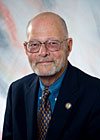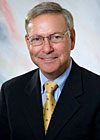New UHV program to improve high school instruction, encourage more students to go to college
The University of Houston-Victoria wants to improve the quality of teaching and learning in South Texas high schools through a new collaboration between the region's school districts, community colleges, business leaders and the Region III Education Service Center.
 |
|
John Stansell |
"This is a simple program that will do a lot to improve education in South Texas," said John Stansell, UHV Dean of the School of Education & Human Development. "We've got to try a different approach in Texas to help our students, teachers and schools."
Mastering Our Future will provide high school teachers from Victoria and the other 10 counties in Region III with scholarships to assist in obtaining their master's in education from UHV. Scholarships will be funded through a partnership between UHV, area school districts, businesses and community members.
Teachers will have the opportunity to select from a variety of concentrations such as English, biology, computer science, history and math. They can take their classes at times that are convenient for them because all the courses will be offered online.
After the teachers complete their master's degrees, which include 18 credit hours in their teaching field, they will have the potential to earn more money. Area community colleges can hire them as adjunct instructors and pay them extra to teach dual-credit courses at their high schools. Some school districts also pay a higher salary to teachers with master's degrees.
 |
| Wayne Beran |
By taking dual-credit courses, students can make the transition to college more smoothly because they will have experience with college-level courses, Beran said. Students also will potentially graduate from college in less time because they will start college with some credit hours already earned.
"This will be a tremendous opportunity for high school students in Region III to see that college is a goal they can achieve, and this is a way for students to save money because they'll be able to graduate from college faster," he said.
By taking advantage of the scholarship offerings, teachers in Mastering Our Future may be required to teach at their district for several years after obtaining their master's degree. This will help school districts retain quality teachers, a goal the Goliad Independent School District had this summer when it started a program similar to Mastering Our Future. Beran also is president of the Goliad ISD School Board.
"We are working to enhance the knowledge base of our teachers," Goliad ISD Superintendent Sam Atwood said. "Our Master Degree Incentive Plan has brought a new level of excitement to our district."
The district has six teachers taking part in its program, he said. It reimburses district teachers a maximum of $8,000 for obtaining a masters degree in their content area or grade level.
When Mastering Our Future begins, Goliad ISD wants to work with the other school districts involved with the program, Atwood said.
"There is strength in numbers, and we want a large number of school districts, community colleges and business leaders to participate in this program so that all of us can work together on improving education in the region," he said.
Beran and Stansell recently presented the idea for Mastering Our Future to school superintendents during a Region III meeting. Retired UHV education professor Robert Zawadzki is the Mastering Our Future liaison, who, along with Beran and Stansell, will be working to get as many school districts involved as possible.
"Congratulations to UHV for developing a program to overcome the barriers of cost and inconvenience to teachers who wish to obtain an advanced degree," said Julius Cano, Region III executive director.
Funding for Mastering Our Future would come from area businesses, but getting donations is not expected to be a problem if more school districts and community colleges become interested, UHV President Tim Hudson said.
"We've gotten several large grants recently, including a nearly $500,000 grant from the Greater Texas Foundation to fund a program to increase the number of teachers in Texas," he said. "It is encouraging to know that businesses and foundations are interested in improving education in this region."
For more information about becoming involved with Mastering Our Future, contact Zawadzki at 361-575-0067, Stansell at 361-570-4260 or Beran at 361-570-4811.
The University of Houston-Victoria, located in the heart of the Coastal Bend region since 1973 in Victoria, Texas, offers courses leading to more than 80 academic programs in the schools of Arts & Sciences; Business Administration; and Education, Health Professions & Human Development. UHV provides face-to-face classes at its Victoria campus, as well as an instructional site in Katy, Texas, and online classes that students can take from anywhere. UHV supports the American Association of State Colleges and Universities Opportunities for All initiative to increase awareness about state colleges and universities and the important role they have in providing a high-quality and accessible education to an increasingly diverse student population, as well as contributing to regional and state economic development.
Paula Cobler
361-570-4350




